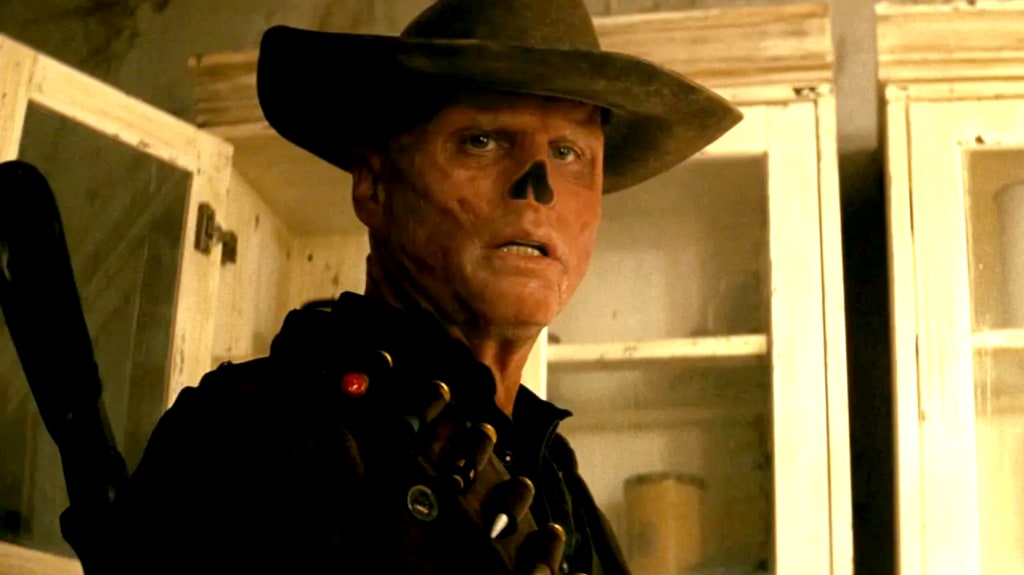The FALLOUT Series and the Question of Enemies
Why fear the communists when we are the enemies ourselves?

Just binge watched the entire season of FALLOUT. All eight episodes in a row because I’m a good little film addict that way. The end credits were coming up with he sun and I have to say it was worth the rough day ahead. That's how good I think the show is.
Now, it’s no easy task to adapt a beloved video game series played by millions of people across the world for decades starting for some in 1988 with its predecessor Wasteland. Most of us didn’t play for the story lines which in my opinion were the most forgettable element of the games. I and many played simply to survive the post-apocalyptic wastelands, gather resources, collect cool weapons and kill Super Mutants. Quite frankly it’s not a lot to work with when ultimately the main character is the world itself – its Cold War 1950’s aesthetic with smiling faces of Americana hope and prosperity staring out from blasted billboards rusting in the nuclear wind to classic Buicks filled with skeletons frozen in death at the time the bombs fell while the Ink Spots’ “I Don’t Want to Set the World on Fire” croons from some radio DJ somewhere out there in the Wasteland. What does one do with that? You’ve got a grand stage but no narrative elements that can easily be transferred to screen.
Well, you’ll be happy to know that creators Geneva Robertson-Dworet and Graham Wagner found a way. They created a compelling, intelligent story with rich complex characters while capturing the look, action and atmosphere of the game. The show is gorgeous, brilliantly acted, well paced and throws twists at you that you don’t see coming. It’s mature, intelligently thought out and sets a tone that is dramatic but with a campy humor that doesn’t take itself seriously. It’s also a masterclass in establishing characters. Even the side characters are all fully realized and compelling even if they only have a couple minutes of screen time. The sets and costumes feel lived in and worn, care taken down to the smallest detail and giving the game audience all the nostalgia we could want from the weapons, locations and armor to the the miscellaneous posters, art and knickknacks strewn throughout the game. Production designer Howard Cummings? Kudos to you and your team, sir.
FALLOUT is also violent as hell – heads crushed, heads blown off, fingers cut off...it’s a ballet of gore but none of it comes off gratuitous in this context. The violence at the end of Once Upon a Time in Hollywood or Django Unchained? It’s like that - and you can clearly see a Tarantino influence.
I don’t want to give too much away because the twists start early in the show and you deserve to experience them. The story centers on Lucy (a wonderful Ella Purnell) who lives in Vault 33, one of multiple highly complex, impenetrable, multi-leveled bomb shelter communities around the country set up by corporate entities to repopulate the world with its remaining survivors. It’s been 200+ years since the bombs fell and she has literally not seen the light of day nor any of her predecessors since the massive Vault doors closed. A false sun by day and moon by night are projected onto a massive dome to give the illusion they are in a real world with real hope. But despite all of that the message is clear: The outside world will kill you, never leave – period and to do so is forbidden.
But vaults are creepy places where behind the thick veneer of nicety something just doesn’t feel right, like something has gone putrid in the fridge but you can’t find it and something terrible could happen at any minute.
Then something terrible happens.
Lucy’s father (Kyle MacLachlan) is kidnapped and now she is dead set on finding him and with the help of her brother Norm (Moises Arias of Enders Game) she makes her escape into the Wasteland. Naive, barely equipped but single-minded in her quest, she encounters, befriends, fights with and is betrayed by numerous characters who both help, hinder and try to kill her along the way. But despite all the horrible things the Wasteland dishes out too her she maintains a moral center of the Golden Rule – “Do unto others as you would have others do unto you.” It may sound unsophisticated on the surface, even laughable in this world, but it’s that belief that gives Lucy her true north.
Among the myriad of characters she meets, she finds a companion in Maximus (Aaron Moten) who is part of the Brotherhood of Steel, a self-created military army whose purpose is to find lost technology to rebuild the world. The problem is that a crucial piece of new technology that would change the Wasteland forever gets swiped by a scientist who flees with his dog and the pursuit to find him is on. But the word gets out and now everybody wants this thing at any cost.
Maximus is an ambitious soldier having been rescued by the Brotherhood when he was a child after the last bombs fell. But he is a conflicted man having just made a questionable moral call which left a fellow soldier dead and now finds himself in a pickle needing Lucy’s help. They form a tenuous bond and they decide to journey together each with they’re own intertwined goals: She has to find her father, he needs to retrieve this technology and now due the predicaments of their situations one goal cannot happen without the other. To get this technology is now the means to get her father back and that endeavor seems lethal at every turn.
And then we have the Ghoul played by the extraordinary Walten Goggins (The Righteous Gem Stones and The Hateful Eight.) He is the most complexly written character of the entire show and quite frankly IS the show and I believe will ultimately be known as one of the most perfect villains. You know you have a successful actor when you can’t imagine anyone else playing them. Before the bombs fell he was a Hollywood cowboy actor named Cooper Howard, a John Wayne style personality known for his all American values and family lifestyle. He is likable, intelligent and open - a self-realized man with strong ideals and unflappable patriotism. In other words the perfect America paragon.
But when corporatism begins to creep into his world and tries to alter his ethical choices in his films he begins to have misgivings. eg. Due to a last minute script change his film character suddenly has to shoot a man where the moral Coop never would have. He acquiesces to his later regret. It’s the slow creep of moral compromise. Though he loathes the corporate world it is one he tolerates for the sake of a paycheck.
He’s then is naively recruited by his wife to be the poster child for Vault-Tec to promote the new Vault system. In the various iterations of his promotional poses Coop spontaneously gives the big thumbs up which the propagandists lock on to. It’s the symbol that everything is going to be okay and you and your family will be taken care of if you have enough money to buy into the system. This is now the origin story for the iconic “thumbs up” man we see in the game. It’s equally brilliant and tragic for ultimately it was a lie, a lie he unwittingly started.
Then the bombs fell.
In the game, as here there are people known as ghouls who survive but are mutated by radiation. They retain all of their memory, personality and function but in order to maintain this status they must take copious amounts of a special serum lest their minds decay and they turn into ravenous zombies and are the junkies of the Wasteland. And so we meet Coop the Ghoul in the present with an introduction that sets him soundly as the fiend of the Wasteland. After two centuries the Coop we knew with all his idealism is long gone having been burned away by the cruelties of the Wasteland. What we have now is simply “the Ghoul” – a creature equally wise, skilled and knowledgeable as he is cruel, fearless and remorseless but with a humor which tempers his violence – a villain with a seasoned balance of attributes which begs a compassion for him and demands a respect from the audience. For all his callousness you simply can’t hate him. That is a hard character to write let alone play and Goggins is masterful. If he doesn’t get an Emmy for this role then I’m going to punch myself in the face.
His tussling back and forth with Lucy is the best thing in the show. He knows her bright-eyed naivety and tries to break her of it in brutal ways. But the show has the mature nuance that these actions could be seen ironically as a form of cold compassion - that if she doesn’t learn the cruelties of the Wasteland and be as cold and merciless as the world around her then she will never survive and and never achieve her goal of finding her father. He believes she will ultimately have to become like him. But she pushes back. Though now hating him, she still believes there still is some humanity laying somewhere dormant in him...and she makes us believe so too.
Sure, the show is not without its flaws. Characters often make nonsensical choices that put themselves in peril for the sake of plot twists and how characters find each other just at crucial moments begs credulity, but all of these things get forgiven when you’re on a ride so good as this.
And though not a criticism, the politics of the show are not subtle. They beg the question, “Why fear the communists when we are the enemies ourselves?” Corporations got us into this mess and it’s only the rising up of the ordinary people that can restore us to peace. The problem with that is that “the people” are horribly violent as well. But I’m not here to settle the Marxism vs Capitalist debate. You can derive your own conclusions but what we are left with is Lucy’s idealism: the Golden Rule and I’ll take that to the bank.
Ultimately FALLOUT is a show about dangerous trust and maintaining an ethical grounding in a world that has none. The finale is equally satisfying and heartbreaking and though leaving the door open to a second season (which it richly deserves) it doesn’t beg for it. Even if the show ends here you know you’ve been taken on a great journey by people who deeply know storytelling and respect the fans – something that most of contemporary Hollywood has forgotten.
About the Creator
Kevin Rolly
Artist working in Los Angeles who creates images from photos, oil paint and gunpowder.
He is writing a novel about the suicide of his brother.
http://www.kevissimo.com/
FB: https://www.facebook.com/Kevissimo/
Enjoyed the story? Support the Creator.
Subscribe for free to receive all their stories in your feed. You could also pledge your support or give them a one-off tip, letting them know you appreciate their work.






Comments
There are no comments for this story
Be the first to respond and start the conversation.